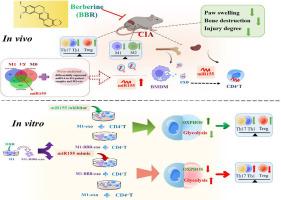Phytomedicine ( IF 6.7 ) Pub Date : 2023-12-04 , DOI: 10.1016/j.phymed.2023.155255 Wei-Wei Cai 1 , Yi Gao 1 , Jing-Wen Cheng 1 , Yun Yu 1 , Shi-Ye Zong 1 , Yu-Hui Li 1 , Ying Wang 2 , Yi-Ning Song 2 , Xiao-Ting Mao 1 , Jie Guan 1 , Long Xu 1 , Die-Yu Zhang 1 , Kai Li 1 , Fang Wei 2

|
Background
The inflammatory cascade mediated by macrophages and T cells is considered to be an important factor in promoting the progression of rheumatoid arthritis (RA). Our previous study found that berberine (BBR) can therapeutically impact adjuvant arthritis (AA) in rats through the regulation of macrophage polarization and the balance of Th17/Treg. However, whether BBR's effects on CD4+T cells response are related to its suppression of M1 macrophage still unclear.
Purpose
The study aimed to estimate the mechanism of BBR in regulating the immunometabolism and differentiation of CD4+T cells are related to exosome derived from M1-macrophage (M1-exo).
Study-design/methods
Mice model of collagen-induced arthritis (CIA) was established to investigate the antiarthritic effect of BBR was related with regulation of M1-exo to balance T cell subsets. Bioinformatics analysis using the GEO database and meta-analysis. In vitro, we established the co-culture system involving M1-exo and CD4+ T cells to examine whether BBR inhibits CD4+T cell activation and differentiation by influencing M1-exo-miR155. Exosome was characterized using transmission electron microscopy and western blot analysis, macrophage and CD4+T cell subpopulation were detected by flow cytometry. Further, the metabolic profiles of CD4+T cells were assessed by ECAR, OCR, and the level of glucose, lactate, intracellular ATP.
Result
BBR reinstates CD4+ T cell homeostasis and reduces miR155 levels in both M1-exo and CD4+ T cells obtained from mice with CIA. In vitro, we found exosomes are indispensable for M1-CM on T lymphocyte activation and differentiation. BBR reversed M1-exo facilitating the activation and differentiation of CD4+T cells. Furthermore, BBR reversed glycolysis reprogramming of CD4+T cells induced by M1-exo, while these regulation effects were significantly weakened by miR155 mimic.
Conclusion
The delivery of miR-155 by M1-exo contributes to CD4+ T cell immunometabolism dysfunction, a process implicated in the development of RA. The anti-arthritic effect of BBR is associated with the suppression of glycolysis and the disruption of CD4+ T cell subsets balance, achieved by reducing the transfer of M1-exo-miR155 into T cells.
中文翻译:

小檗碱调节 CD4+ T 细胞的免疫代谢和分化,通过抑制 M1-exo-miR155 减轻实验性关节炎
背景
巨噬细胞和T细胞介导的炎症级联被认为是促进类风湿性关节炎(RA)进展的重要因素。我们之前的研究发现,小檗碱 (BBR) 可通过调节巨噬细胞极化和 Th17/Treg 平衡来治疗大鼠佐剂性关节炎 (AA)。然而,BBR对CD4 + T细胞反应的影响是否与其抑制M1巨噬细胞有关仍不清楚。
目的
该研究旨在评估BBR调节CD4 + T细胞免疫代谢和分化的机制与M1巨噬细胞来源的外泌体(M1-exo)有关。
研究设计/方法
建立胶原诱导关节炎(CIA)小鼠模型,研究BBR的抗关节炎作用与调节M1-exo平衡T细胞亚群有关。使用GEO数据库和荟萃分析进行生物信息学分析。在体外,我们建立了M1-exo和CD4 + T细胞的共培养系统,以检测BBR是否通过影响M1-exo-miR155来抑制CD4 + T细胞的活化和分化。使用透射电子显微镜和蛋白质印迹分析对外泌体进行表征,通过流式细胞术检测巨噬细胞和 CD4 + T 细胞亚群。此外,通过 ECAR、OCR 以及葡萄糖、乳酸、细胞内 ATP 水平评估 CD4 + T 细胞的代谢特征。
结果
BBR 可恢复 CD4 + T 细胞稳态并降低从 CIA 小鼠获得的 M1-exo 和 CD4 + T 细胞中的 miR155 水平。在体外,我们发现外泌体对于M1-CM T淋巴细胞的活化和分化是不可或缺的。 BBR逆转M1-exo促进CD4 + T细胞的激活和分化。此外,BBR 逆转了 M1-exo 诱导的 CD4 + T 细胞的糖酵解重编程,而这些调节作用则被 miR155 模拟物显着削弱。
结论
M1-exo 传递 miR-155 会导致 CD4 + T 细胞免疫代谢功能障碍,这一过程与 RA 的发展有关。 BBR 的抗关节炎作用与糖酵解的抑制和 CD4 + T 细胞亚群平衡的破坏有关,这是通过减少 M1-exo-miR155 向 T 细胞的转移来实现的。











































 京公网安备 11010802027423号
京公网安备 11010802027423号